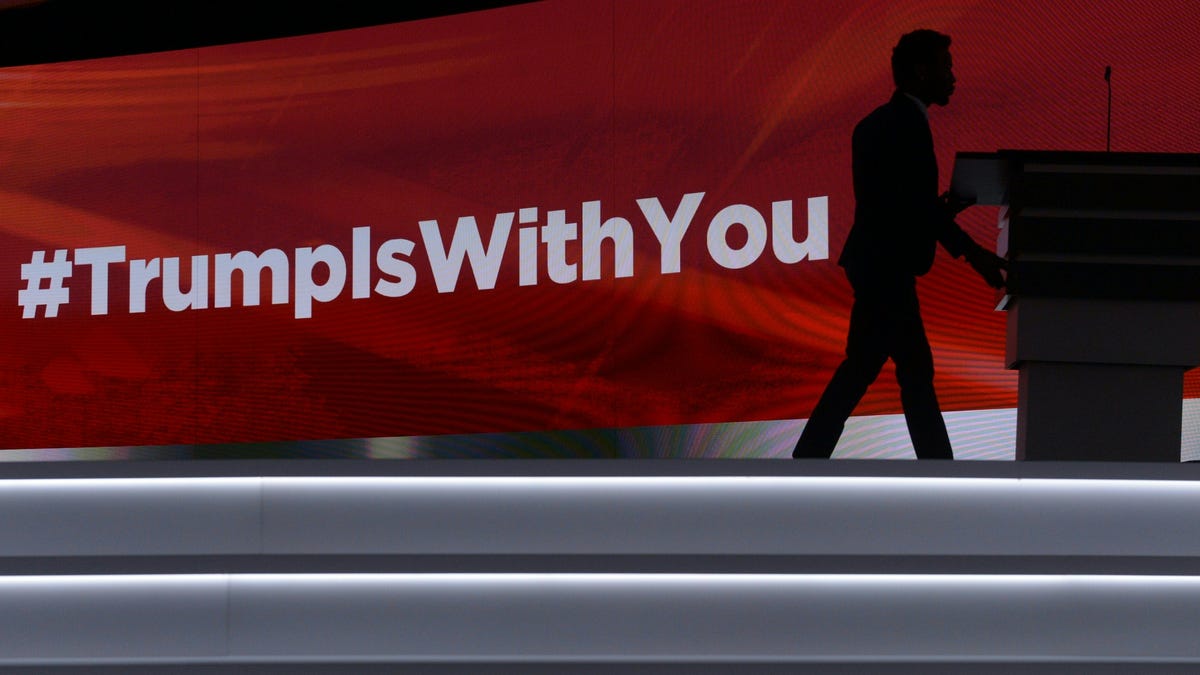Social media's inescapable presence at the RNC
The GOP confab in Cleveland witnessed Facebook and Twitter playing a bigger role than ever before.

Four years ago, Facebook and Twitter shared the same small space on Radio Row at the Republican and Democratic national conventions. Both social networks were growing, but not quite mainstream.
Not anymore. Social networks -- including Snapchat, Instagram, Medium, and YouTube -- this week were an inescapable presence that rivaled traditional media at the RNC in Cleveland.
Radio Row is now called Media Row. Walk up to the entrance of the Quicken Loans Arena, the RNC venue, and there's Facebook Central, a snazzy two-story pavilion, complete with an Oculus Rift VR room and data touch screens to see which candidates are being discussed the most. There's also a studio where nearly two dozen media organizations, including CNN and Fox, were busy airing live broadcasts that also appeared on the new, immensely popular Facebook Live.
Go around the corner and there's #TwitterCaucusRoom at Media Row. Twitter's main space featured multiple screens showing the latest GOP-related tweets, data and who's trending. Next to it: the "Blue Room," a boutique-style see-through studio with plush chairs where media members could conduct interviews with politicians and celebrities and air them on Twitter's Periscope live-streaming service. It's been the most digital Republican National Convention ever.
More on Election 2016
Social media is again redefining how we get our news.
That was never more apparent than when a journalist revealed on Twitter late Monday that Melania Trump, during her well-received RNC speech, had lifted parts of First Lady Michelle Obama's speech from the 2008 Democratic convention. Sure enough, the backlash led to a uber-trending hashtag, #FamousMelaniaTrumpQuotes as the scandal dominated the news cycle the next day.
Adam Sharp, Twitter's head of news, government and elections, shows the social network's top trends following the opening night of the RNC.
"Here we saw, despite the very scripted prime-time mark of these conventions, a story that broke and developed on Twitter overnight and by the next morning was setting the agenda for day two of the convention," said Adam Sharp, Twitter's head of news, government and elections. During speeches at the RNC each night, Twitter said it's been averaging more than a million tweets.
While Twitter and Facebook had locked in deals to live-stream the convention through CBS and ABC, respectively, Monday showed that the major networks no longer hold as much power in terms of broadcasting big events, said C.C. Chapman, a Boston-based podcaster and social media expert. He thinks either Facebook or Twitter will be in a position to have its own network in time for the 2020 conventions.
"By the next election for sure they will be, if they make the right decisions," Chapman said. "Social media is the network for us in the know. In the future, it will be for many."
During the RNC, more than 15 million people discussed the RNC on Facebook, resulting in some 40 million comments, according to Joel Kaplan, the company's vice president for public policy. Though it's unclear what type of broadcast network Facebook might become, Kaplan expects immersive platforms like live video and VR to reach massive audiences.
"We want people to come to Facebook to create their own content," he said. "We just want to provide the space, the opportunity and the technology for politicians and media to broadcast live. That's where we feel we can make the most impact."
We'll report back in four years.



